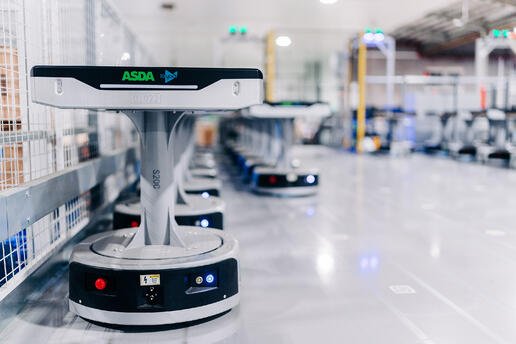Geek+, a global leader in robotic automation solutions, has collaborated successfully with Asda Logistics Services (ALS) and AMH Material Handling to launch an intelligent sorting system in Asda’s distribution centre. The system will provide Asda with the capacity to support continued growth across its parcel collection and returns business.
Sixty robots have been placed into the supermarket’s South Elmsall, West Yorkshire distribution centre, allowing 2,000 parcels to be sorted each hour with 99.99% accuracy through its Asda toyou service.
The installation marks the first time the technology has been used in this way in the UK, supporting an increase in capacity for Asda toyou’s services as demand for parcel collection and returns services has grown at pace in the last 12 months. With the pandemic causing a change in customer behaviour and an uplift in the number of purchases made online, Asda toyou experienced significant growth through the provision of a reliable, convenient returns solution that allowed shoppers to combine activities in a single trip to an Asda store.
At the same time, Asda toyou has expanded the number of retailers it supports. Over 100 are now available via the service, which has seen it process 65% more returns than at the start of 2020.
The project was implemented by AMH Material Handling, a top provider of material handling solutions, and Geek+. By integrating S20C robots into the existing ALS sorting system, it has provided Asda toyou the ability to respond to rapid changes in order volume and continue to provide excellent services during periods of peak demand.
Lit Fung, VP and Managing Director of Geek+ APAC, UK and Americas, says: “We’re proud to see AMH leverage our sorting system to support a leading retailer like Asda with the flexibility and efficiency needed to expand its Asda toyou business. The process for intelligent sorting is pretty straightforward. By letting a network of AMRs transfer incoming parcels from workstations to cages of corresponding destinations, we can improve accuracy and efficiency while also making the process more ergonomic for warehouse employees. With no need for fixed platform development, it makes it easy for Asda to scale operations in line with business growth. All they have to do is adjust the number of robots and destination chutes.”
Adrian Carter, Sales Director at AMH Material Handling, says: “We had a lot of fun delivering the solution as Geek+ sorting robots are a highly flexible technology that can be integrated and customized to work with existing equipment on customer sites, such as conveyor belts or other robots. It provides us a powerful tool for optimizing sorting operations according to the specific needs of each customer. And, as an integrator, AI-enabled robotics solutions add a new dimension to our services as it allows us to continuously support our customers according to changes in business needs.”
Jon Parry, Vice President of Asda Logistics Services (ALS) at Asda, says: “We’re pleased to be one of the first retailers in the UK to pioneer the Geek+ S20C robots in our National Sortation Centre working in collaboration with partners at Geek+ and AMH. The robots work alongside our colleagues, enabling us to drive greater efficiencies at times of peak demand, which have helped to boost the number of parcels we’re now able to sort through our Asda toyou service.”
Geek+ and AMH started to cooperate in 2019 when AMH recognized Geek+ robotics solutions provided industry-leading technology. Today, the two work closely together to provide clients all over the UK with great automation solutions.





